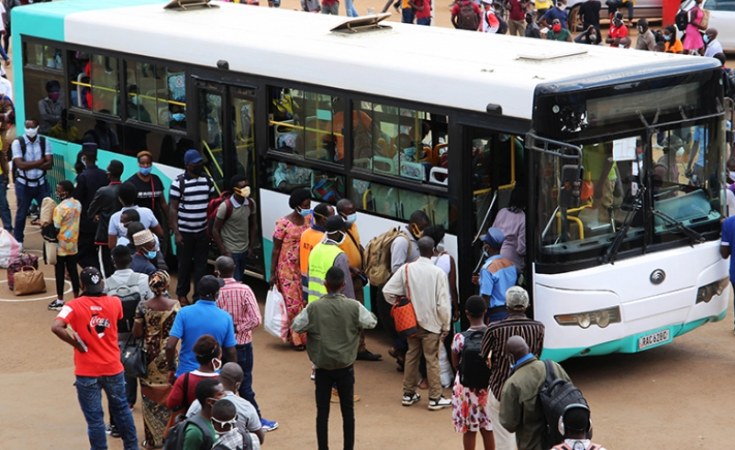Every year, the issue of public transport in Kigali clouds the media space, and over time, different measures have been suggested but it persists. One cannot ignore the fact that matters that are of public interest - like public transport - are equally of concern to government.
A visit to different bus terminals and bus stops across Kigali during morning hours will give you a real-time experience of what exactly passengers have to endure on a daily basis.
According to Anselme Nshimiyimana, a passenger from Kimironko taxi park, the only way to fix the public transport sector is to avail as many buses as possible.
"The only way to get a bus easily is to wake up so early and be at the bus station by 05:00am because, arriving at say 7:00am, means you are going to queue for a while and arrive at work by 9:00am," Nshimiyimana said.
Many commentators say that such problems aren't unique to Rwanda, they are common in many fast developing cities.
Rapidly-developing cities have booming businesses that attract mass movements of city dwellers, an expanding city with new neighbourhoods coming up means increased demand for public transport to service those routes.
Speaking on national television on Sunday, July 30, different officials noted several mechanisms being worked on to fix issues in public transport, mainly in the City of Kigali.
Among the suggested solutions include new buses but the demand is too high and passengers keep increasing, which may eventually be a stretch for the few licensed operators.
Before the authorities came in to regulate public transport - which was itself a timely intervention on many fronts - anyone who owned a bus freely joined the market, as long as they registered their bus as a passenger service vehicle.
At the time, business was being done in the most disorganised manner which was too risky for both the passengers and operators themselves. This attracted regulation, which, the regulations came with their advantages.
The regulations which were introduced in 2013 saw three passenger service companies win the bid to exclusively operate in Kigali, with each given its own dedicated routes.
To a large extent, regulation has worked but what if the city has outgrown regulations and now needs standard operating procedures that would orient operators just like the way taxi motos operate?
What does this mean
Under the taxi moto model, anyone can own a bike but getting it into the taxi business, there are requirements they must have and after fulfilling them, they may start operating.
They are not limited to which routes they can operate on. Their charges are based on the distance covered on the journey.
Speaking to The New Times, Damien Ndizeye the Executive Secretary of Rwanda Consumer's Rights Protection Organization (ADECOR) said the same style can be adopted in public transport.
"If the model in which motos operate is effective, then it should be adopted. This would eliminate monopoly and encourage competition. The main beneficiary here would be the passenger," he said.
He added: "In fact, in most countries, public transport is managed by the state but if the government handed it to the private sector and placed RURA at the helm of regulating the sector, then RURA should focus more on the interests of the public than those of the profit oriented businesses."
Ndizeye believes that as long as there is no competition in the public transport sector, services will not be effective.
"Regulation has brought us a lot of good, including innovations and upgrades on the buses and roads but before this sector was placed under regulation, it's the taxi drivers that ran after passengers; today, it's the passengers running after the buses. This shows that there is something wrong in the management of the sector," he said.
Asked what exactly he thinks is going wrong in the sector, Ndizeye said it was the issue of monopoly.
"An entire route is operated by one player, the same player decides when to dispatch and when not to dispatch a bus as passengers wait. RURA should fully open up the market or should place several operators on each lane and create competition."
He however acknowledged that the government has done everything within its means to fix issues in the industry including offering subsidies on fuel to public transporters.
"The efforts should be felt by the passengers yet passengers keep complaining," said Ndizeye.
City Hall reacts
Speaking to The New Times, City of Kigali engineer, Asaba Katabarwa dismissed claims that the transport sector is not liberalised.
"Liberalisation depends on how you want to define it but what remains a fact is, public transport is very liberalised and that's why tenders are put out and operators compete. That's liberalisation otherwise we only need to address the issues within the sector, come up with long and sustainable solutions, he said.
Katabarwa added that, "Right now, we are working with all stakeholders to deliver solutions to this problem and among the solutions include availing enough buses."
Meanwhile, while appearing on public television on Sunday July 31, Katabarwa said that to fix the issues in the industry, there is a need to bridge the gap of 271 public buses that are needed.
Currently, some transporters have already placed orders for some buses as part of providing a long term solution to the problem.
Katabarwa also suggested that one of the solutions would be having a passenger information system, an idea that he also shares with Ndizeye who is rallying for digital billboards in bus stop shelters.
These, he said, will allow for passengers to monitor and also able to book a seat on the buses along particular routes.
emusoni@newtimesrwanda.com
Follow https://twitter.com/EdwinMusoni


